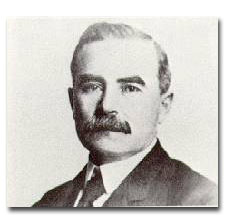GREAT CITIZENS - JOSEPH STEPHEN CULLINAN
 The legacy of Joseph Stephen Cullinan reached beyond that of other Houston greats. Born in Sharon, Pennsylvania, to Mary and John Francis Cullinan, he began working as a refiner in the Pennsylvania oil fields at an early age. Six years before he moved to Texas in 1897, Cullinan married Lucy Halm.
The legacy of Joseph Stephen Cullinan reached beyond that of other Houston greats. Born in Sharon, Pennsylvania, to Mary and John Francis Cullinan, he began working as a refiner in the Pennsylvania oil fields at an early age. Six years before he moved to Texas in 1897, Cullinan married Lucy Halm.
Arriving in Corsicana, Cullinan organized the first pipeline and refining company in Texas, J.S. Cullinan and Company. Later it became the Magnolia Petroleum Company. To increase the consumption of oil, at a time when the automobile industry was still in its infancy, Cullinan introduced two new applications of petroleum: as fuel for locomotives and as a dust settler on streets.
In 1901, Cullinan moved to Beaumont, Texas. In March, with the support of such investors as the Hogg-Swayne Syndicate, with former governor James S. Hogg a principal, he established the Texas Fuel Company for the purchase and transfer of oil from the Spindletop field. In March 1902, Cullinan formed the Texas Company, for the storage and transportation of oil, and marketed its products under the brand name Texaco.
Soon Cullinan formed many subsidiaries to deal in petroleum products. In 1905, he acquired new oil field leases, including one at the Humble field in northern Harris County. He constructed refineries at Port Arthur and Port Neches and initiated an international marketing program. By 1908, Cullinan relocated the Texas Company headquarters to Houston.
Cullinan served as president of the Texas Company from 1903 to 1913, the year the company's headquarter moved to New York. From there it continued diversifying and expanding, both nationally and internationally and, by 1929, it operated refineries in six Texas cities. It was well on its way to becoming the energy giant it is today.
J.S. Cullinan died at the age of 76 in Palo Alto, California. In 1959, some 22 years later, the name of his Texas Company was officially changed to Texaco, Inc. Although Texaco is still headquartered in New York, Cullinan's concentration of the company's operations in Houston at the turn of the century, initiated a trend which resulted in the city's preeminence as a center for the oil industry. The twenty-two Petroleum Building which Cullinan built in downtown in the early 1900's, is among the legacies of his endeavors.






